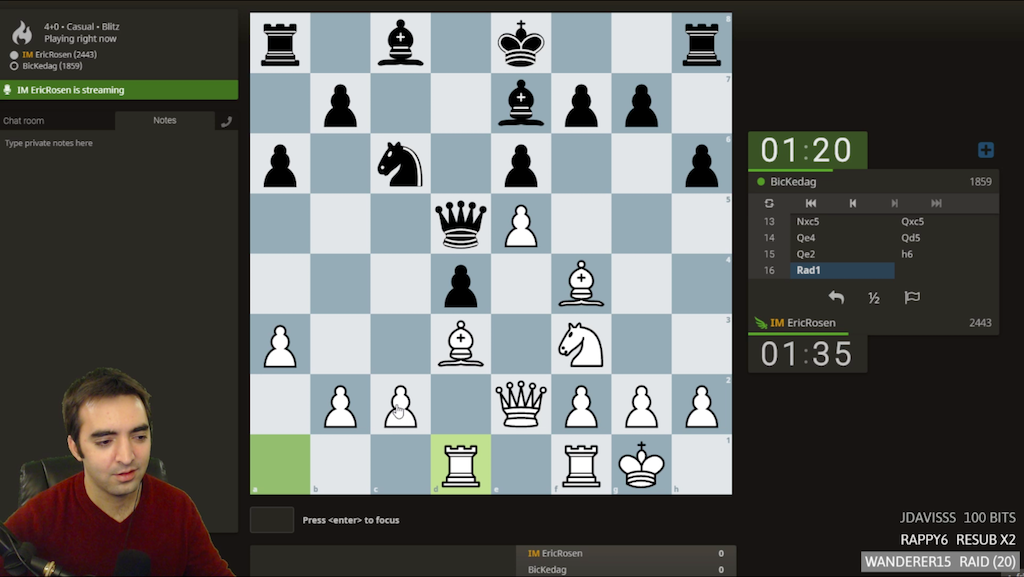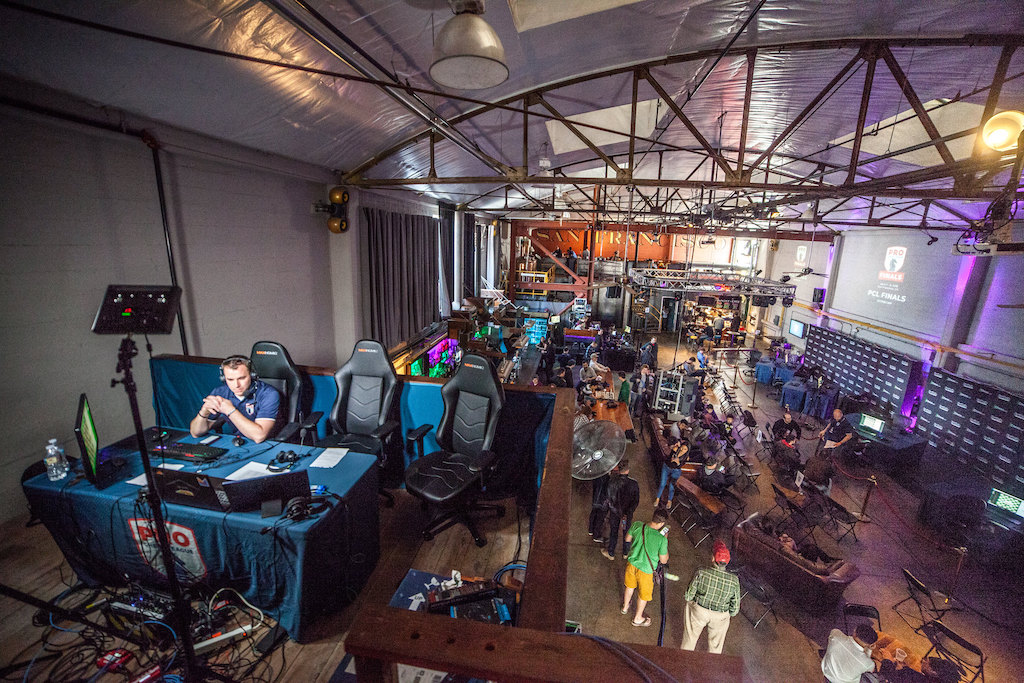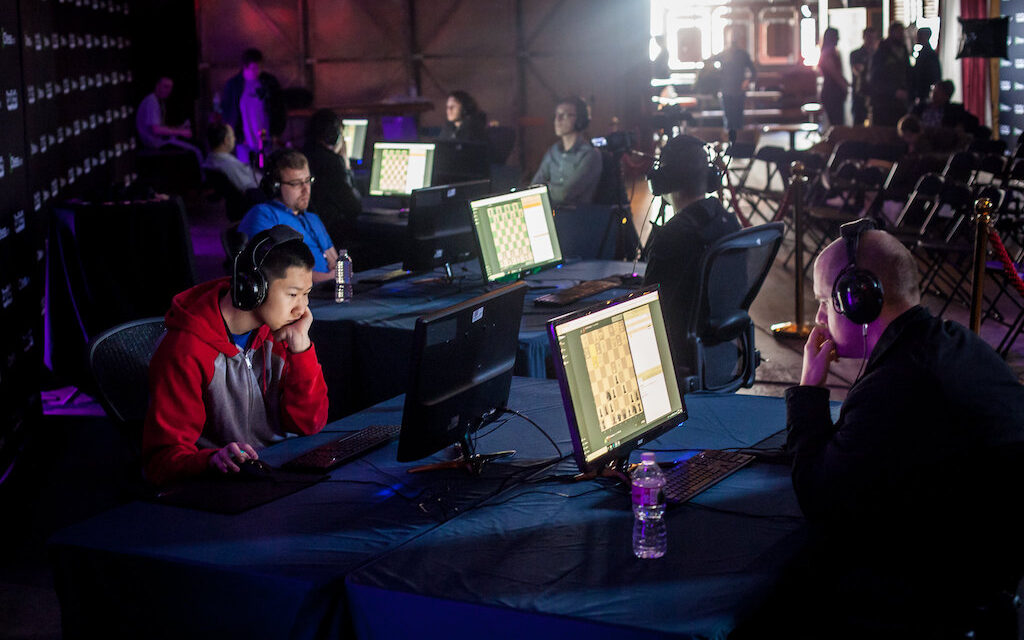Players competing online at the Professional Chess League finals in 2018. (Photo by Eric Rosen)
OTTAWA – Zach Dukic and some members of the University of Ottawa Chess Club have been meeting in his spacious backyard every couple of weeks for in-person chess matches. Trading their boards for screens, the club is planning online tournaments as the chilly winter months roll in.
Dukic, a National Master of chess in Canada and president of the University of Ottawa Chess Club, has noticed an increase in newcomers to the club, most of whom are hesitant to attend the in-person meetups.
“Once we start organizing online tournaments again, I expect we’ll see a lot of new participants,” Dukic said.
Awareness of chess has grown since the beginning of the pandemic shutdown in March.
“It’s obvious chess is increasing in popularity, and I’m experiencing that as well,” Dukic said, referring to the growing number of enquiries about chess lessons in his inbox.
Over the past year, online chess has seen a significant spike in interest as people find themselves stuck at home during the pandemic. Ranging from user growth on websites like Lichess and Chess.com, to increased consumption of chess content on websites like Twitch and Youtube, 2020 has seen a chess boom.
The game of chess has been seen as a slow and boring game that is too hard to understand for most people. But this idea is changing as more entertaining content makes the game accessible to a wider audience.
The pandemic has provided the opportunity for millions of players, old and new, to jump into the sea that is the game of chess.
A few factors can be identified as having nudged the public consciousness onto the chess board
- In late April, Grandmaster Hikaru Nakamura began livestreaming his chess games on Twitch.com.
- In early June, multiple competitive and amateur online tournaments were broadcast through the same website, attracting thousands of viewers and garnering a significant following.
- Netflix released the Queen’s Gambit in October, a series which has been credited with popularizing chess even further.
Monthly online chess games on Lichess.org began to spike in March when people started staying home. There is a second spike in October, likely caused by Netflix’s popular series The Queen’s Gambit.
Antonio Giamberardino, one of Dukic’s students, has played chess since he learned the rules when he was 12, and it has remained an important pastime of his since then.
Giamberardino, 34, first decided to pursue lessons with Dukic in order to improve his game in 2017. “My skills had kind of flatlined. I never got better then where I was,” he said.
Then life got busy with a family and he took a step away from chess lessons. It wasn’t until October of this year when he decided to return to his former coach.
“These days I’m not really going anywhere, I’m pretty much at home every single day. I was watching the Queen’s Gambit and I thought I should really start studying again and taking it seriously,” Giamberardino said.
The Queen’s Gambit follows the growth of a fictional chess prodigy named Beth Harmon as she learns the game and delves into the world of international competitive chess in the 1970s.
Netflix reported that 62 million households watched the Queen’s Gambit in the first 28 days of its release, making it the most popular scripted limited series on Netflix to date.
62 million households watched the Queen’s Gambit on Netflix in the first 28 days of its release.
Part of what appeals to players about chess is the near infinite amount of possibilities the board holds while also allowing players to know exactly where they made the right or wrong move among an unfathomable number of choices.
While other games tend to become repetitive, a chess player will never play the same game twice.
There are more possible chess games then there are atoms in the universe. “It doesn’t matter how many years you’ve studied it, you’re going to make mistakes and you’re going to learn from them,” Dukic said.
To supplement his lessons, Giamberardino watches educational chess content on websites like Youtube, where he learns specific openings, variations and tricks to pull off against unsuspecting opponents.
One of the chess players he watches is Eric Rosen, an International Master of chess from St. Louis who livestreams chess on the internet full-time, focusing on chess education and entertainment.

A screenshot taken from one of Eric Rosen’s live streams on the website Twitch.com.
Rosen’s Youtube channel has seen a steady increase from 40,000 daily views in January, all of the way to 300,000 daily views in October.
Rosen said the foundation for a large online chess community existed since before the pandemic. “I think the build-up over the last three years of chess streamers and platforms like Lichess and Chess.com made this explosion possible,” he said. “The community was ripe for an influx of new players.”
Websites like Lichess and Chess.com allow players to connect with strangers of a similar skill level to play virtual games of chess.
While online chess has been used in a competitive setting before, such as the Pro Chess League (PCL) finals in 2018 and 2019, Rosen speculates that it may become the new way tournaments are organized post-pandemic.

Not your typical chess tournament, the format for the Professional Chess League finals in 2018 may inspire organizers to rethink how chess competitions work post-pandemic. (Photo by Eric Rosen)
The PCL finals were different, said Rosen who attended both. “It went against everything you knew about a typical chess event,” he said. “It was super loud, the players played in the same room as the commentary and the spectators. I think we’ll see more of these types of events after things go back to normal.”
Vlad Drkulec, president of the Canadian Federation of Chess, said almost all face-to-face events scheduled for 2020 have been postponed until 2021, while others have migrated online.
“We’re still grappling with the issues of online chess versus over the board chess,” Drkulec said.
Playing chess online means it is impossible to tell for certain if a player is cheating, which is a problem for competitive tournaments.
But for millions of players around the world, online chess has become their way to play and learn the game.
Giamberardino continues to play online chess and has even started his own club that competes within itself in friendly round robin competitions.
Pre-pandemic was different. “Before I wouldn’t have engaged with people chatting, or I wouldn’t look at chess moves online,” Giamberardino said. “There’s that sense of community around it now, where before it was just a kind of nerdy thing I did on my phone when the kids are asleep.”





